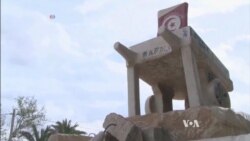As Tunisians prepare to go to the polls Sunday to elect a new assembly, security forces on Friday killed six people, including five women, after a standoff with an Islamist militant group on the outskirts of Tunis.
The raid on the house in Oued Ellil, west of the capital, was the latest operation in Tunisia's crackdown on Islamist militants authorities say threaten the country's transition to democracy following the 2011 fall of Zine El-Abidine Ben Ali.
Sunday's vote will be the second free election since the uprising that ousted Ben Ali and it is seen as a test of the transition to democracy amid a region in turmoil.
The town of Sidi Bouzid is where the first seed of the Arab uprisings was sown when street vendor Mohamed Bouazizi set himself on fire in protest at local officials.
Nearly four years on, Tunisia is about to take the next step on in its shaky journey from dictatorship to democracy. But there appears to be early disillusionment.
“I don't have confidence in politicians. If they are worthy of they wouldn't have left our country in this situation since the revolution,” said one Sidi Bouzi resident.
In the 2011 election after that revolution, ideological disputes over Tunisian identity and the role of Islam dominated.
Now the focus is on the economy - and that could hit voter turnout, said Gerasimos Tsourapas of the London School of Oriental and African Studies.
“The unemployment rate, for instance, currently in Tunisia is 16 or 17 percent, which is quite high and comparable to levels before the Tunisian uprisings. If you look at youth unemployment, it’s over 30-35 percent,” said Tsourapas.
Despite the faltering economy, Tsourapas said Tunisia’s transformation should not be underestimated.
In 2012 Tunisia appeared on the brink of descending into chaos after the assassination of two opposition politicians. Hardline Islamists were convicted of the murders - and the ruling Islamist Ennahda party accused of tolerating extremists.
Ennahda agreed to hand power to a caretaker government pending fresh elections. Ennahda leader Rached Ghannouchi said the party is prepared to work together with rival parties after the election.
"We have become more realistic and more aware of the nation's reality, capable of building consensus and more convinced by the consensus policy,” said Ghannouchi.
Ennahda is unlikely to enjoy the same success it had at the 2011 elections, thinks Tsourapas.
“This is because, having been in opposition for so many decades, they were able to put forward a very popular program and agenda, that once they get to power, however, they’re forced to make concessions, they’re forced to compromise,” said Tsourapas.
Political observers say it is that willingness to compromise that has rescued Tunisia from the unrest and violence seen in other Arab Spring countries like Egypt and Libya.
“Back in 2011, Tunisia was still able to serve as this beacon of this model for the remaining countries in transition across the Arab world. So there was a sense of responsibility. Three years down the line, Egypt, Syria, Yemen, all these states have taken such different routes that they are highly unlikely to follow the Tunisian example nowadays,” Tsourapas said.
The presidential election will be held in November. Ennahda has opted against fielding a candidate - for the sake of Tunisian unity, it says.
Some information for this report provided by Reuters.





